Family Strengths Framework in Healthcare: A Comprehensive Overview
VerifiedAdded on 2022/10/01
|6
|1145
|275
Essay
AI Summary
This essay examines the evolving role of the family in contemporary society and its significant impact on healthcare outcomes. It emphasizes that positive patient health outcomes are influenced by social and emotional factors, with the family playing a crucial role in ensuring patient wellbeing. The essay introduces the family strengths framework, which assesses protective factors within a family that contribute to the wellbeing of all members. It highlights key factors such as interpersonal communication, commitment, and the ability to cope with challenges. The application of this framework in healthcare practice, particularly in assessing an individual’s risk for physical or mental health comorbidities, is also discussed. The essay concludes that a family strengths-based assessment assists families and patients in achieving positive health outcomes by identifying strengths and limitations, ultimately promoting overall family functioning and patient recovery. References from various scholarly sources are provided to support the arguments presented.
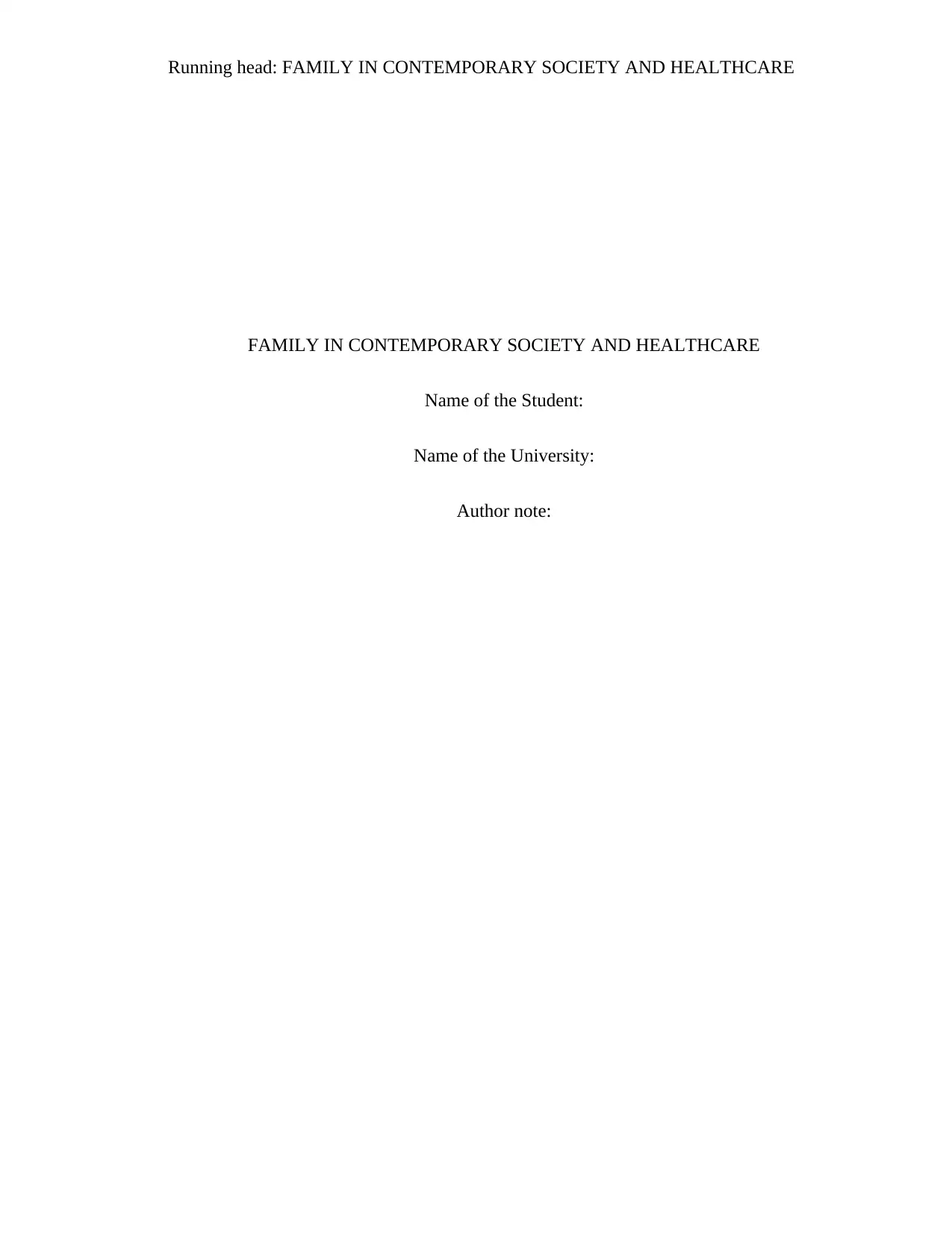
Running head: FAMILY IN CONTEMPORARY SOCIETY AND HEALTHCARE
FAMILY IN CONTEMPORARY SOCIETY AND HEALTHCARE
Name of the Student:
Name of the University:
Author note:
FAMILY IN CONTEMPORARY SOCIETY AND HEALTHCARE
Name of the Student:
Name of the University:
Author note:
Paraphrase This Document
Need a fresh take? Get an instant paraphrase of this document with our AI Paraphraser
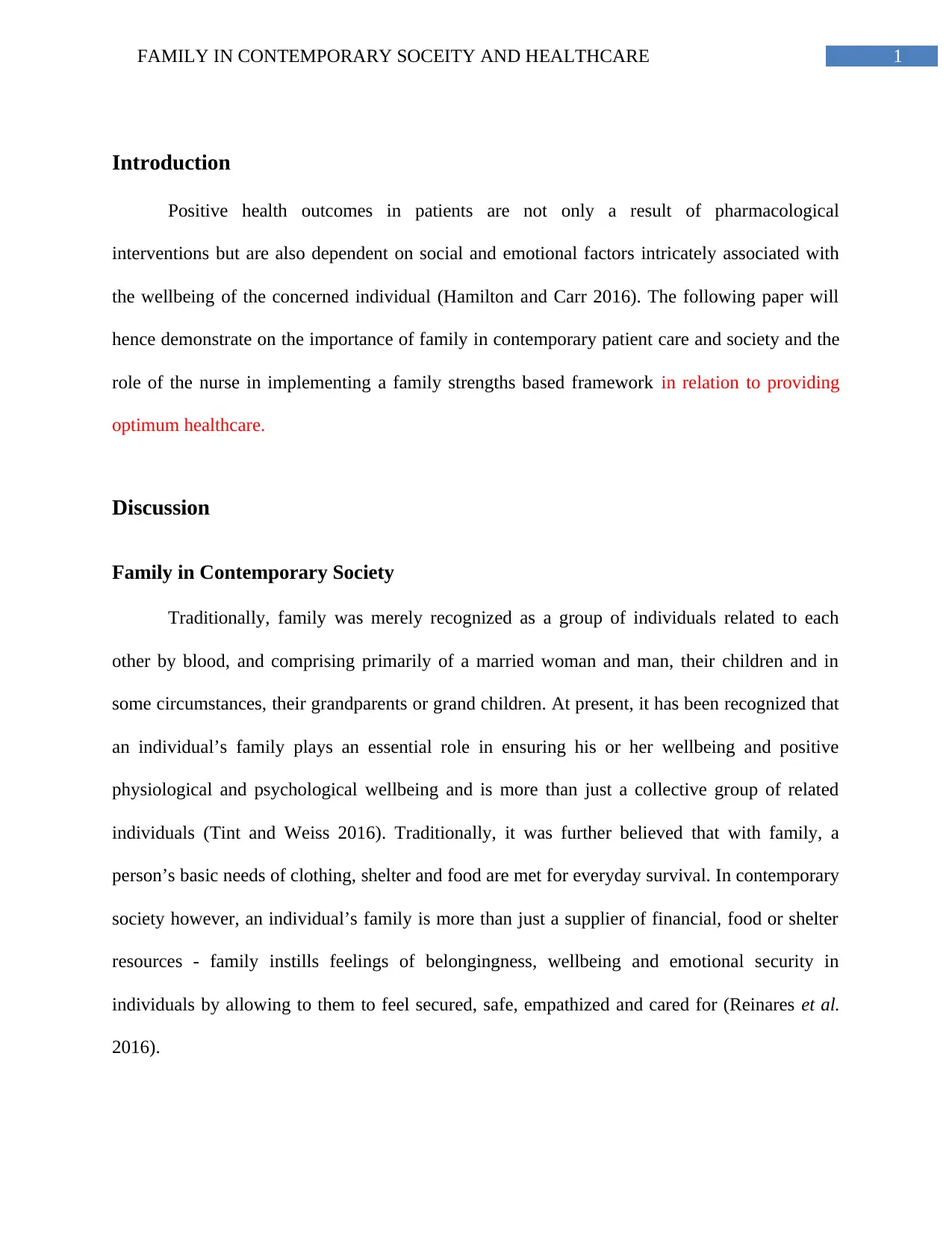
1FAMILY IN CONTEMPORARY SOCEITY AND HEALTHCARE
Introduction
Positive health outcomes in patients are not only a result of pharmacological
interventions but are also dependent on social and emotional factors intricately associated with
the wellbeing of the concerned individual (Hamilton and Carr 2016). The following paper will
hence demonstrate on the importance of family in contemporary patient care and society and the
role of the nurse in implementing a family strengths based framework in relation to providing
optimum healthcare.
Discussion
Family in Contemporary Society
Traditionally, family was merely recognized as a group of individuals related to each
other by blood, and comprising primarily of a married woman and man, their children and in
some circumstances, their grandparents or grand children. At present, it has been recognized that
an individual’s family plays an essential role in ensuring his or her wellbeing and positive
physiological and psychological wellbeing and is more than just a collective group of related
individuals (Tint and Weiss 2016). Traditionally, it was further believed that with family, a
person’s basic needs of clothing, shelter and food are met for everyday survival. In contemporary
society however, an individual’s family is more than just a supplier of financial, food or shelter
resources - family instills feelings of belongingness, wellbeing and emotional security in
individuals by allowing to them to feel secured, safe, empathized and cared for (Reinares et al.
2016).
Introduction
Positive health outcomes in patients are not only a result of pharmacological
interventions but are also dependent on social and emotional factors intricately associated with
the wellbeing of the concerned individual (Hamilton and Carr 2016). The following paper will
hence demonstrate on the importance of family in contemporary patient care and society and the
role of the nurse in implementing a family strengths based framework in relation to providing
optimum healthcare.
Discussion
Family in Contemporary Society
Traditionally, family was merely recognized as a group of individuals related to each
other by blood, and comprising primarily of a married woman and man, their children and in
some circumstances, their grandparents or grand children. At present, it has been recognized that
an individual’s family plays an essential role in ensuring his or her wellbeing and positive
physiological and psychological wellbeing and is more than just a collective group of related
individuals (Tint and Weiss 2016). Traditionally, it was further believed that with family, a
person’s basic needs of clothing, shelter and food are met for everyday survival. In contemporary
society however, an individual’s family is more than just a supplier of financial, food or shelter
resources - family instills feelings of belongingness, wellbeing and emotional security in
individuals by allowing to them to feel secured, safe, empathized and cared for (Reinares et al.
2016).
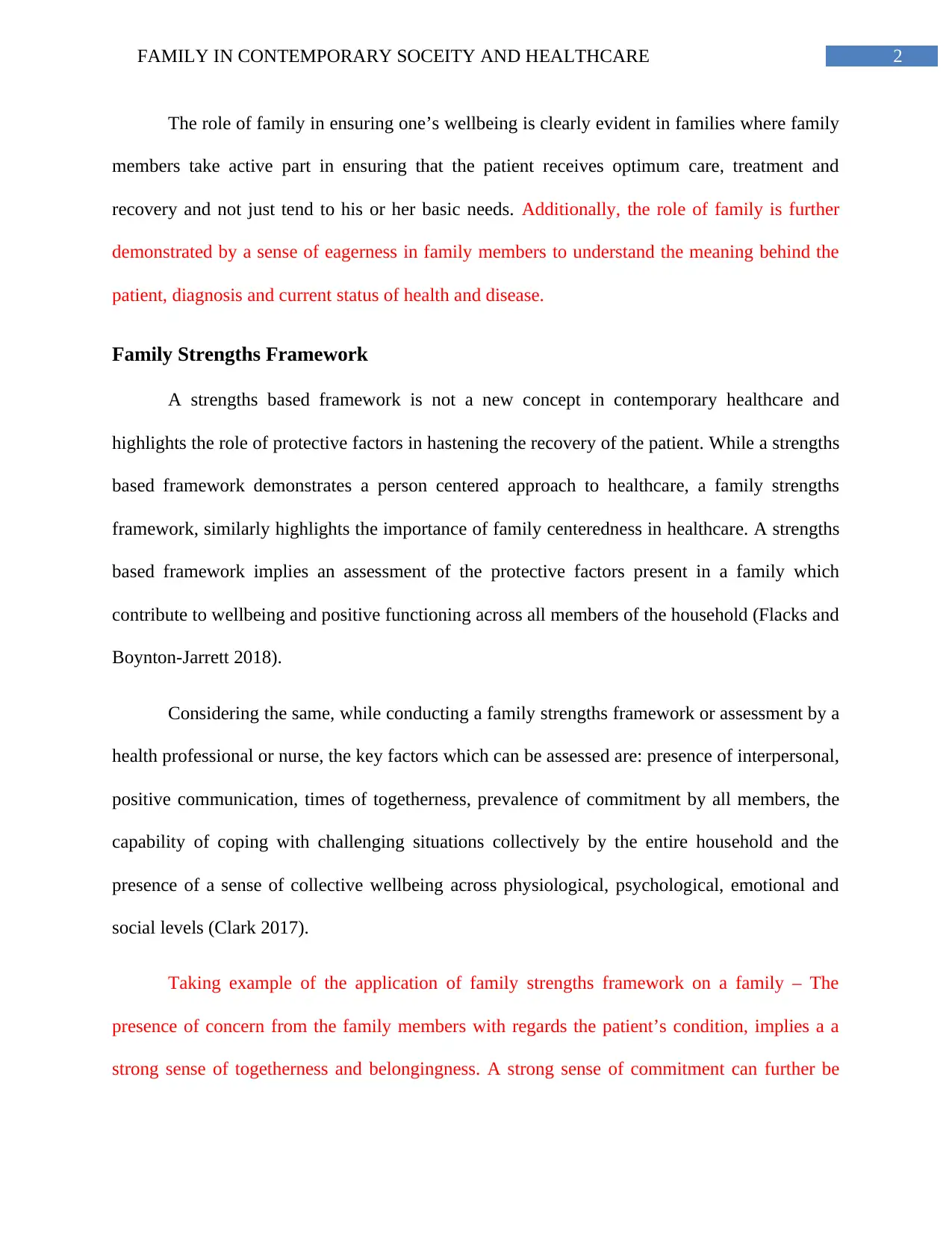
2FAMILY IN CONTEMPORARY SOCEITY AND HEALTHCARE
The role of family in ensuring one’s wellbeing is clearly evident in families where family
members take active part in ensuring that the patient receives optimum care, treatment and
recovery and not just tend to his or her basic needs. Additionally, the role of family is further
demonstrated by a sense of eagerness in family members to understand the meaning behind the
patient, diagnosis and current status of health and disease.
Family Strengths Framework
A strengths based framework is not a new concept in contemporary healthcare and
highlights the role of protective factors in hastening the recovery of the patient. While a strengths
based framework demonstrates a person centered approach to healthcare, a family strengths
framework, similarly highlights the importance of family centeredness in healthcare. A strengths
based framework implies an assessment of the protective factors present in a family which
contribute to wellbeing and positive functioning across all members of the household (Flacks and
Boynton-Jarrett 2018).
Considering the same, while conducting a family strengths framework or assessment by a
health professional or nurse, the key factors which can be assessed are: presence of interpersonal,
positive communication, times of togetherness, prevalence of commitment by all members, the
capability of coping with challenging situations collectively by the entire household and the
presence of a sense of collective wellbeing across physiological, psychological, emotional and
social levels (Clark 2017).
Taking example of the application of family strengths framework on a family – The
presence of concern from the family members with regards the patient’s condition, implies a a
strong sense of togetherness and belongingness. A strong sense of commitment can further be
The role of family in ensuring one’s wellbeing is clearly evident in families where family
members take active part in ensuring that the patient receives optimum care, treatment and
recovery and not just tend to his or her basic needs. Additionally, the role of family is further
demonstrated by a sense of eagerness in family members to understand the meaning behind the
patient, diagnosis and current status of health and disease.
Family Strengths Framework
A strengths based framework is not a new concept in contemporary healthcare and
highlights the role of protective factors in hastening the recovery of the patient. While a strengths
based framework demonstrates a person centered approach to healthcare, a family strengths
framework, similarly highlights the importance of family centeredness in healthcare. A strengths
based framework implies an assessment of the protective factors present in a family which
contribute to wellbeing and positive functioning across all members of the household (Flacks and
Boynton-Jarrett 2018).
Considering the same, while conducting a family strengths framework or assessment by a
health professional or nurse, the key factors which can be assessed are: presence of interpersonal,
positive communication, times of togetherness, prevalence of commitment by all members, the
capability of coping with challenging situations collectively by the entire household and the
presence of a sense of collective wellbeing across physiological, psychological, emotional and
social levels (Clark 2017).
Taking example of the application of family strengths framework on a family – The
presence of concern from the family members with regards the patient’s condition, implies a a
strong sense of togetherness and belongingness. A strong sense of commitment can further be
⊘ This is a preview!⊘
Do you want full access?
Subscribe today to unlock all pages.

Trusted by 1+ million students worldwide
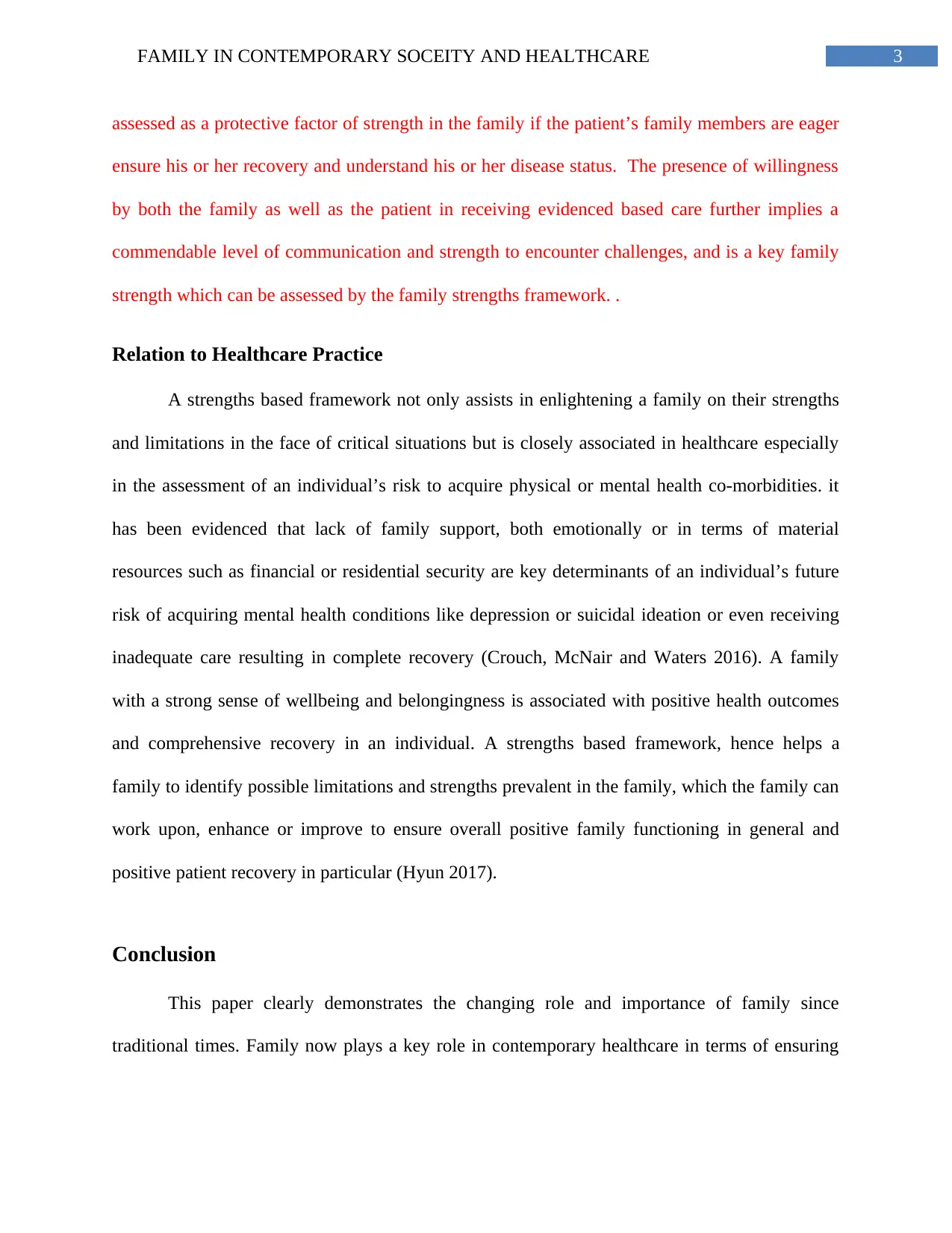
3FAMILY IN CONTEMPORARY SOCEITY AND HEALTHCARE
assessed as a protective factor of strength in the family if the patient’s family members are eager
ensure his or her recovery and understand his or her disease status. The presence of willingness
by both the family as well as the patient in receiving evidenced based care further implies a
commendable level of communication and strength to encounter challenges, and is a key family
strength which can be assessed by the family strengths framework. .
Relation to Healthcare Practice
A strengths based framework not only assists in enlightening a family on their strengths
and limitations in the face of critical situations but is closely associated in healthcare especially
in the assessment of an individual’s risk to acquire physical or mental health co-morbidities. it
has been evidenced that lack of family support, both emotionally or in terms of material
resources such as financial or residential security are key determinants of an individual’s future
risk of acquiring mental health conditions like depression or suicidal ideation or even receiving
inadequate care resulting in complete recovery (Crouch, McNair and Waters 2016). A family
with a strong sense of wellbeing and belongingness is associated with positive health outcomes
and comprehensive recovery in an individual. A strengths based framework, hence helps a
family to identify possible limitations and strengths prevalent in the family, which the family can
work upon, enhance or improve to ensure overall positive family functioning in general and
positive patient recovery in particular (Hyun 2017).
Conclusion
This paper clearly demonstrates the changing role and importance of family since
traditional times. Family now plays a key role in contemporary healthcare in terms of ensuring
assessed as a protective factor of strength in the family if the patient’s family members are eager
ensure his or her recovery and understand his or her disease status. The presence of willingness
by both the family as well as the patient in receiving evidenced based care further implies a
commendable level of communication and strength to encounter challenges, and is a key family
strength which can be assessed by the family strengths framework. .
Relation to Healthcare Practice
A strengths based framework not only assists in enlightening a family on their strengths
and limitations in the face of critical situations but is closely associated in healthcare especially
in the assessment of an individual’s risk to acquire physical or mental health co-morbidities. it
has been evidenced that lack of family support, both emotionally or in terms of material
resources such as financial or residential security are key determinants of an individual’s future
risk of acquiring mental health conditions like depression or suicidal ideation or even receiving
inadequate care resulting in complete recovery (Crouch, McNair and Waters 2016). A family
with a strong sense of wellbeing and belongingness is associated with positive health outcomes
and comprehensive recovery in an individual. A strengths based framework, hence helps a
family to identify possible limitations and strengths prevalent in the family, which the family can
work upon, enhance or improve to ensure overall positive family functioning in general and
positive patient recovery in particular (Hyun 2017).
Conclusion
This paper clearly demonstrates the changing role and importance of family since
traditional times. Family now plays a key role in contemporary healthcare in terms of ensuring
Paraphrase This Document
Need a fresh take? Get an instant paraphrase of this document with our AI Paraphraser
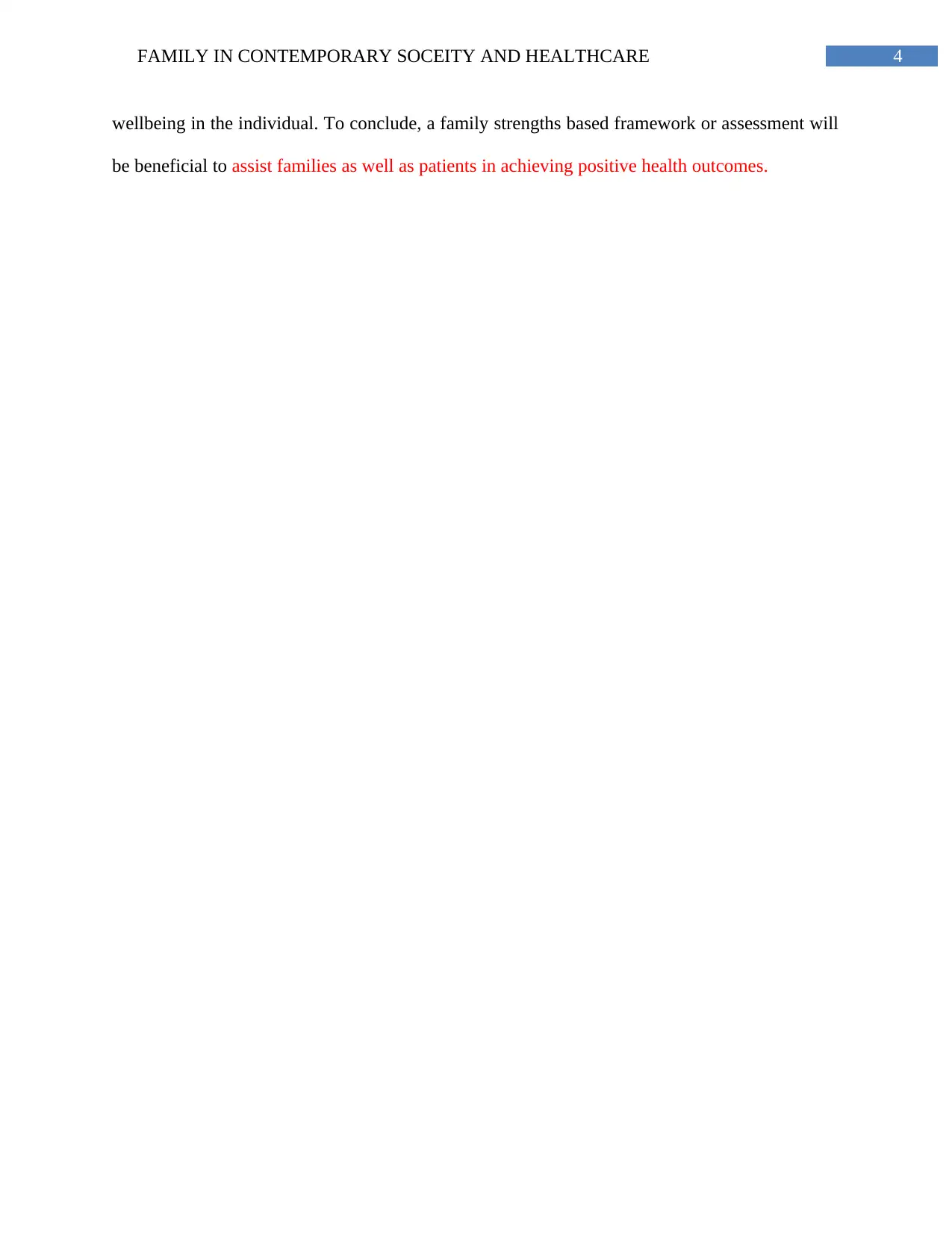
4FAMILY IN CONTEMPORARY SOCEITY AND HEALTHCARE
wellbeing in the individual. To conclude, a family strengths based framework or assessment will
be beneficial to assist families as well as patients in achieving positive health outcomes.
wellbeing in the individual. To conclude, a family strengths based framework or assessment will
be beneficial to assist families as well as patients in achieving positive health outcomes.
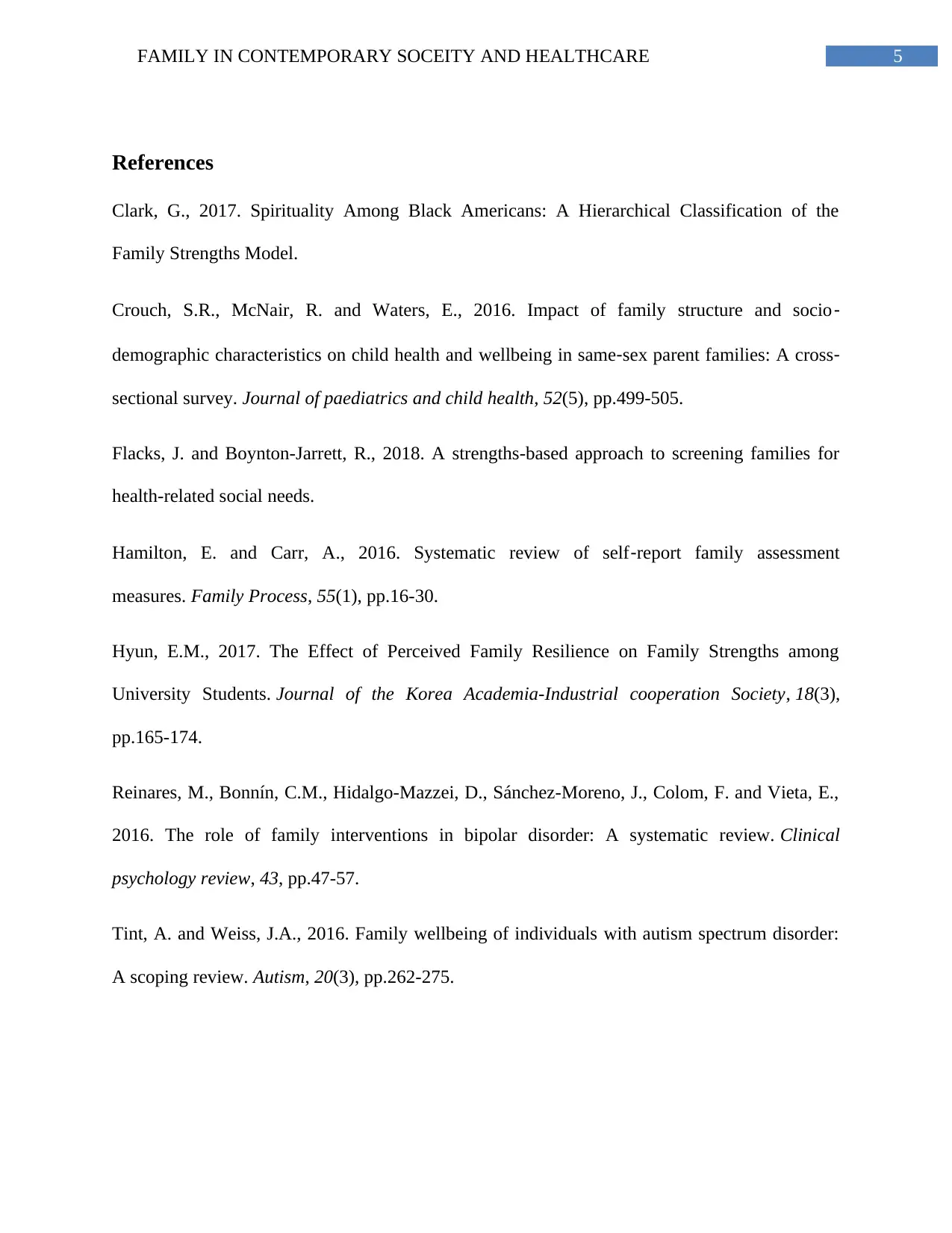
5FAMILY IN CONTEMPORARY SOCEITY AND HEALTHCARE
References
Clark, G., 2017. Spirituality Among Black Americans: A Hierarchical Classification of the
Family Strengths Model.
Crouch, S.R., McNair, R. and Waters, E., 2016. Impact of family structure and socio‐
demographic characteristics on child health and wellbeing in same‐sex parent families: A cross‐
sectional survey. Journal of paediatrics and child health, 52(5), pp.499-505.
Flacks, J. and Boynton-Jarrett, R., 2018. A strengths-based approach to screening families for
health-related social needs.
Hamilton, E. and Carr, A., 2016. Systematic review of self‐report family assessment
measures. Family Process, 55(1), pp.16-30.
Hyun, E.M., 2017. The Effect of Perceived Family Resilience on Family Strengths among
University Students. Journal of the Korea Academia-Industrial cooperation Society, 18(3),
pp.165-174.
Reinares, M., Bonnín, C.M., Hidalgo-Mazzei, D., Sánchez-Moreno, J., Colom, F. and Vieta, E.,
2016. The role of family interventions in bipolar disorder: A systematic review. Clinical
psychology review, 43, pp.47-57.
Tint, A. and Weiss, J.A., 2016. Family wellbeing of individuals with autism spectrum disorder:
A scoping review. Autism, 20(3), pp.262-275.
References
Clark, G., 2017. Spirituality Among Black Americans: A Hierarchical Classification of the
Family Strengths Model.
Crouch, S.R., McNair, R. and Waters, E., 2016. Impact of family structure and socio‐
demographic characteristics on child health and wellbeing in same‐sex parent families: A cross‐
sectional survey. Journal of paediatrics and child health, 52(5), pp.499-505.
Flacks, J. and Boynton-Jarrett, R., 2018. A strengths-based approach to screening families for
health-related social needs.
Hamilton, E. and Carr, A., 2016. Systematic review of self‐report family assessment
measures. Family Process, 55(1), pp.16-30.
Hyun, E.M., 2017. The Effect of Perceived Family Resilience on Family Strengths among
University Students. Journal of the Korea Academia-Industrial cooperation Society, 18(3),
pp.165-174.
Reinares, M., Bonnín, C.M., Hidalgo-Mazzei, D., Sánchez-Moreno, J., Colom, F. and Vieta, E.,
2016. The role of family interventions in bipolar disorder: A systematic review. Clinical
psychology review, 43, pp.47-57.
Tint, A. and Weiss, J.A., 2016. Family wellbeing of individuals with autism spectrum disorder:
A scoping review. Autism, 20(3), pp.262-275.
⊘ This is a preview!⊘
Do you want full access?
Subscribe today to unlock all pages.

Trusted by 1+ million students worldwide
1 out of 6
Related Documents
Your All-in-One AI-Powered Toolkit for Academic Success.
+13062052269
info@desklib.com
Available 24*7 on WhatsApp / Email
![[object Object]](/_next/static/media/star-bottom.7253800d.svg)
Unlock your academic potential
Copyright © 2020–2026 A2Z Services. All Rights Reserved. Developed and managed by ZUCOL.





